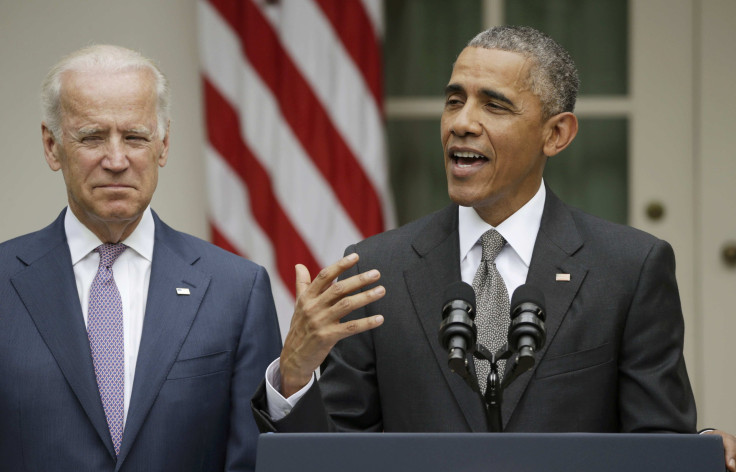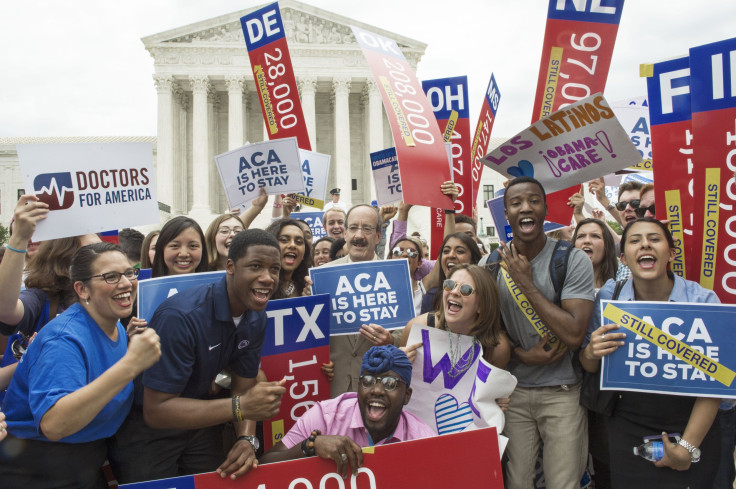Obamacare Too Complex? Controversial Affordable Care Act Is Confusing, Lacks Resources, Some Say

Sherry Diamond has been a tax preparer for more than 30 years, but this spring she found herself donning a second hat: that of unofficial, unintentional insurance agent. In 2015, health insurance mattered for the first time on U.S. tax returns, and Diamond began fielding — and asking — a lot of new questions.
In the days after the Supreme Court ruled 6-3 to uphold a key component of the Affordable Care Act, supporters of the law heaved sighs of relief that it remained intact. At the same time, many were setting their sights on how to fix and improve the law, which is so complex that some say patients deserve the equivalent of accountants or lawyers to help them navigate it. Even those who stand to benefit from the law may not know it, experts said, yet how to make its advantages fully accessible remains to be seen.
“It was confusing,” Sandy Castillo, a resident of Texas, said of her experience scrolling through and comparing plans on HealthCare.gov, the federal website, which Texas uses. “They all kind of look alike after a while,” she said of the different options.
Obamacare, the Affordable Care Act's frequent nickname, is hardly perfect -- a fact U.S. President Barack Obama himself acknowledged Thursday, as did Supreme Court Chief Justice John G. Roberts, who penned the majority opinion in the case, King v. Burwell. “The Affordable Care Act contains more than a few examples of inartful drafting,” Roberts wrote. “The Act does not reflect the type of care and deliberation that one might expect of such significant legislation.”
The Supreme Court decision revolved around the question of federal subsidies, which offset the cost of health insurance and are available to those who qualify based on income. The plaintiffs in King v. Burwell interpreted four words in the law, "established by the State," to mean that subsidies were available only to people living in states who had created their own insurance marketplaces under Obamacare, and not to those living in the 34 states relying on the federal marketplace, HealthCare.gov. When the court sided with the government, many hailed the decision as proof that the Affordable Care Act was here to stay.
Obamacare has been "woven into the fabric of America," Obama declared in a brief address following the court's decision. He touted the law's achievements, such as the dramatic drop in the rate of America's uninsured, even as he acknowledged the fact that the law contained room for improvement. He wrapped up his remarks tersely, saying, "Let's get back to work."
A Confusing Process
For Castillo, a 46-year-old breast cancer survivor and advocate, gaining health insurance through Obamacare finally put an end to years of lurching from one insurance plan to another as she switched jobs and went through spells of unemployment. But the process of signing up for Obamacare — wading through a blur of numbers indicating various premiums, copays and deductibles — wasn’t simple.
To help consumers navigate the website, “they need to utilize different resources that other businesses are using,” Castillo said, suggesting a live chat option. At one point, HealthCare.gov offered the service but then appeared to remove it around or before March 2014. Even when it existed, though, it wasn’t always useful.
With the help of her father, Castillo managed to sign up for a plan she said worked well for her, allowing her to see the medical specialists that a cancer survivor needs. She also successfully signed up for subsidies, a process that required predicting her annual income, to the best of her ability. But the law doesn’t work so smoothly, relatively speaking, for everyone.
"It's changed my tax practice in that every single client now takes a minimum of 10 minutes longer, because I have to interview everyone: 'Do you have insurance? Who do you have it with? I need paperwork,' " Diamond, who said she prepares tax returns for up to 450 clients annually, remarked of the Affordable Care Act's impact on her work. "And it's like, 'What letter? Oh, that thing? I threw it away.' "

This spring was the first time health insurance became applicable in tax filings, because those who didn't have it, or lacked it for part of the year, had to pay a penalty. In addition, some of those who received government subsidies to offset the cost of insurance had to pay a portion of it back, while others received credits.
Diamond found herself having to explain these aspects of the healthcare law — which can be arcane to the average citizen — to some of her clients. Diamond, who has taken classes on the Affordable Care Act geared toward tax preparers, said she felt comfortable with 95 percent of what she had to explain or do for her clients. When they wanted to buy health insurance, she would refer them to a broker.
Still, "there are reasons insurance agents have to take classes and tests and be certified to talk about health insurance," Diamond said. She said she hopes that eventually the law's practical aspects would become more familiar to people. "With use, I'm hoping it'll get more routine."
Other tax preparers have similarly found themselves absorbing the new role that the federal healthcare law requires of them.
"The Affordable Care Act made healthcare a tax issue," said Kathy Pickering, executive director of the Tax Institute at H&R Block. "To the extent that the Affordable Care Act was implemented through the tax code, it is our role to be explaining to [clients] the tax requirements of the Affordable Care Act." When clients want to buy insurance and need help doing so, H&R Block also would refer them to an insurance broker, Pickering said.
The impact of Obamacare on tax preparers is significant enough that at its national conference this summer, the National Association of Tax Preparers plans to offer several classes on the ins and outs of the law. In January, when the New Jersey chapter of the association held a seminar on the Affordable Care Act, it expected a few dozen tax preparers to attend. Instead, roughly 150 showed up, Diamond said.
Great takeaways! MT @rdftaxpro: What I learned (or was reminded) at the @NATPTAX Forum - http://t.co/C3foitK7ZQ #ACA #Obamacare #taxes #tax
— NATP (@NATPTAX) September 17, 2014Compared to employees who have benefits through their workplaces, people who purchase health insurance through exchanges set up by the Affordable Care Act "have a whole different set of challenges," said Michael Greenwald, a certified public accountant who is a partner at Friedman LLP, an accounting firm in New York. Those covered by their employers can often turn to the human resources department with questions about their plans, whereas people who buy through the marketplaces may not have many expert resources to rely on for further explanation.
"What we haven't seen is any one set of professionals really take the lead," Greenwald said. Even employers depend on "a variety of advisers, each of them focusing on one part of the picture," to help them plan out coverage for their employees, he added.
Figuring out health insurance is especially complex for people receiving subsidies, because they have to estimate their annual income, Greenwald pointed out. Self-employed workers, a group likely to buy insurance through Obamacare, often have unpredictable incomes. Because of that, when they file their taxes each year, they have to reconcile projected and actual incomes — a difference that can affect whether they have to pay back subsidies.
"It is extraordinarily complex, and I think over time, it's not going to get any less complex," Greenwald said.

Some liken the complexity of the Affordable Care Act's rules and regulations to that of Social Security. The United States has 1,230 Social Security field offices, according to the official website. Anyone who has a question about Social Security's network of safety net programs can visit a local field office, call a hotline or turn to a website for answers. Helpful or not, these resources exist as an option for people who are confused.
The same cannot be said for the Affordable Care Act. The government should have invested in offices with experts and other resources to help people understand how the law affects them and how they can benefit from it, said Robert Blendon, a professor of public health and health policy and political analysis at the School of Public Health at Harvard University in Cambridge, Massachusetts. But politics prevented that.
"If this was widely supported by the Congress. They would have had offices set up to advise people," Blendon said. However, "That really doesn't exist. If there was bipartisan consensus, they would make this more consumer friendly."
Others questioned whether such resources would make much of a difference.
"Social Security has been around for decades, but people still don't know how it works," Greenwald said. "I suspect that will be the same of the Affordable Care Act 10 years from now."
Still, Greenwald pointed out, "there's a ton of information out there." If people really wanted to inform themselves about how the law works and how it affects them, they could do so, Greenwald argued. Social Security and Obamacare are “complicated but they're not impenetrable," he said.
© Copyright IBTimes 2025. All rights reserved.






















